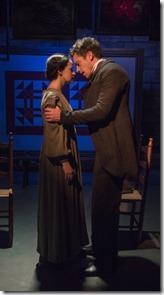
Rivendell's compelling world premiere is well worth seeing

Review by Catey Sullivan
"You want me to be who you think I am, but I am so much more." So asserts convicted murderer Grace Marks to Dr. Simon Jordan, the psychiatrist who is convinced he can unlock the amnesia that seems to prevent Grace - or anyone else - from learning the truth about the brutal ax killing of Thomas Kinnear, a Toronto gentleman farmer, and Nancy Montgomery, the pregnant mistress he was having an affair with.
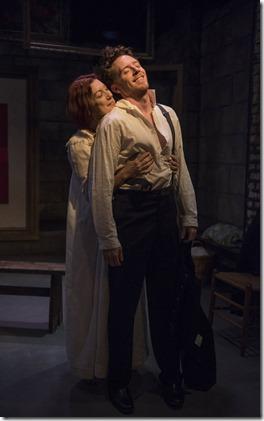
As the line quoted above and prominently featured in Jennifer Blackmer's adaptation of Atwood's novel implies, Grace's every move is defined by others. From pre-puberty on, she is identified by what the glaring male gaze decides she must be. Beyond the contours of her own mind, she is only what men see: A drudge, a slut, a tease, and finally, a demon capable of killing in cold blood.
Blackmer's adaptation of Atwood's sprawling novel does not capture all of the book's power. Certainly the playwright had a nearly impossible task before her: Alias Grace covers some 40 years. The book is an epic of intricate adventures embarked on by both mind and body. It's a dense, meticulously detailed exploration of psychiatry, physiology, gender and class. It grapples in great detail with everything from the conditions of the era's "lunatic asylums" to the best way to bleach soiled handkerchiefs.
Grace is at the center, but the constellation of complex supporting characters is huge: Doctors, paddlers, stable boys, asylum heads, country gentlemen, governors, well-born ladies, abusive fathers, doomed mothers, coy debutantes, fife-playing errand boys, empowering best friends and a host of employers - some bearable, some heinous - make the book a wondrous exploration of time, place and character.
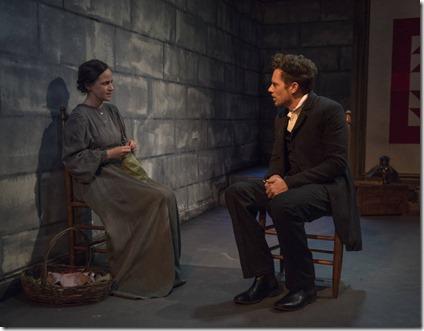
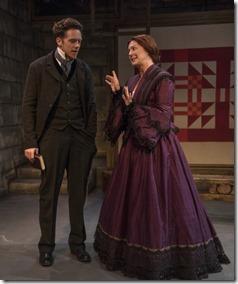
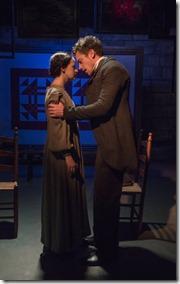
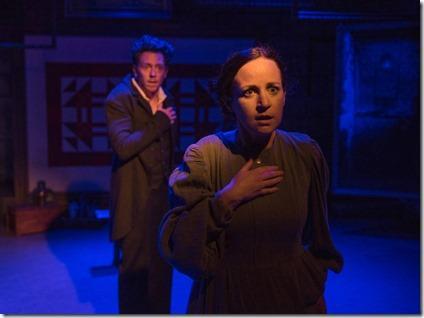
Reducing the novel to two hours traffic on stage is no enviable task. And while Blackmer does a credible job, many of the subtleties of Atwood's sprawling novel are either lost in translation or hammered over-emphatically home with crude obviousness.
Two crucial women from the book - a landlady whose grim domestic situation entangles Dr. Jordan, and a society matron with a prurient interest in Grace's case - are melded into one in Blackmer's adaptation. The merger might be convenient in terms of casting and plotting, but it erases a significant portion of the novel's sweeping yet intimate depictions of the plight of the women in Grace's world.
The translation also struggles with the novel's supernatural elements. Grace is plagued by incorporeal voices and haunting memories, but in Rivendell's staging, these are more reminiscent of middle school slumber party pranks than genuinely terrifying and mystifying phantoms of the brain.
The novel's climactic 'big reveal' - a chilling, shocking scene involving mesmerism - should leave the viewer uneasily grappling with the murky connections between this world and whatever lies unseen and unknowable beyond (or within) it. On stage, it's all B-movie melodrama.
All that said, director Karen Kesslergets exquisite performances from Ashley Nealas Grace Marks and Steve Haggardas Dr. Jordan. The two are fascinating, and they make Alias Grace compelling. Neal's performance etches a character who could be either a psychopath or an innocent pushed beyond her breaking point. Or both. Or neither.
Like the story of her life, Grace's refusal to be tidily diagnosed or slotted into one of the roles allowed women of her age will leave you unsettled. "People want a guilty person. They don't like not knowing," Grace tells Dr. Jordan. That much is inarguable, both on stage and in real life. Neal's refusal to solve Grace like a puzzle is the anchor of the production.
Haggard's Dr. Jordan is less of an enigma, but intriguing nonetheless.He's a doctor who cannot heal himself, and whose seemingly good-hearted desire to provide humane care to the mentally ill cloaks a world of less-than entirely noble intentions. Again, the novel makes more of this, delving into Simon's childhood and his relationships with the maids who served his family. Minus that backstory, he comes across as a better man than he may be.
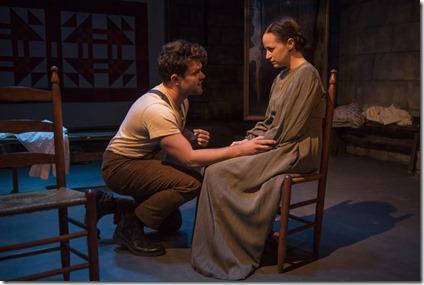
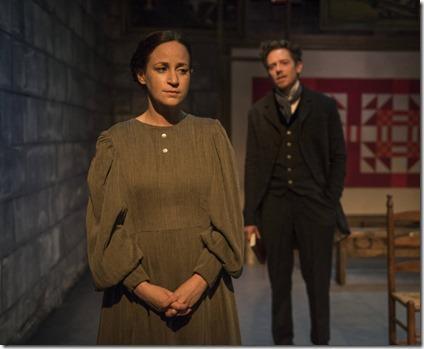
Set designer Elvia Moreno has done superb work weaving the elements of Grace's life into the world of the stage. Quilting plays a large part in the story, and the exquisite stitchery that illustrates the novel is readily apparent. Moreno's attention to detail is also excellent - the backdrop is hung with visuals that play a role in Grace's story, prominently a replica of Rembrandt's "Suzanna and the Elders" and a looming painting of crimson peonies. The set dressing tells a story all by itself: The objects that shape Grace's daily life - a washboard, tea kettles, a crude lute, an ewer, a pair of muck boots, whiskey barrels, milk cans, mending baskets - all add to the narrative.
Janice Pytel's costume design is similarly deft, from Grace's uniformly shapeless, dun-colored shifts to the sky-blue flowers that color the flounces and frills of Nancy Montgomery's frocks.
Finally, Alias Grace is threaded with original music and wonderfully atmospheric sound design. As the terrible fate of Grace's best friend Mary Whitney unfurls, sound designer LJ Luthringerunderscores the words with the solemn toll of church bells, barely on the threshold of audibility. You almost can't hear them, yet they add to the scrim of tragedy inexorably surrounding Grace and Mary.
In addition to playing Nancy, Jane Baxter Millerhas put music to the eerie folk ballad that opens the production and the novel. It's a lilting, haunting tune - part childhood nursery rhyme, and part dirge. In short, it's perfect.
Shortcomings and all, Alias Grace is well worth seeing. The story of Grace Mark is powerful both as history and as a commentary on history. Rivendell hasn't captured the whole of it, but what it has is well the price of a ticket.
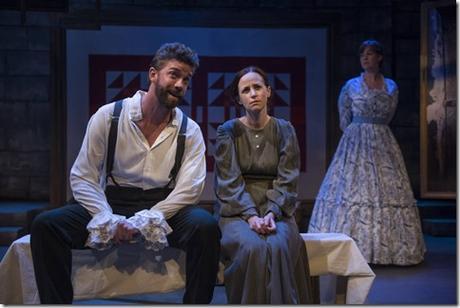
Alias Grace continues through November 5th at Rivendell Theatre, 5779 N. Ridge (map), with performances Thursdays and Fridays 8pm, Saturdays 4pm & 8pm, Sundays 3pm. Tickets are $38 (students, seniors, military: $28), and are available by phone (773-334-7728) or online through their website (check for availability of ). More info at RivendellTheatre.org. (Running time: 2 hours, includes an intermission)
Photos by Michael Brosilow
Ashley Neal (Grace Marks), Steve Haggard (Dr. Simon Jordan), Jane Baxter Miller (Mrs. Rachel Lavell), Ayssette Muñoz (Mary Whitney), Maura Kidwell (Nancy Montgomery), Afro Salama (Jeremiah, Jerome DuPont), Drew Vidal (Thomas Kinnear), David Raymond (James McDermott).
behind the scenes
Karen Kessler (director), Jane Baxter Miller (music for "The Ballad of Grace Marks"), Jennifer Blackmer (lyrics for "The Ballad of Grace Marks"), Brian Nitzkin (associate producer), Jennifer Thusing (stage manager), (dramaturg, assistant director), Melody Ekstrom (research dramaturg), Kathy Logelin (dialect coach), Drew Vidal (movement, violence coordinator), Elvia Moreno Jess Hutchinson (set design), Janice Pytel (costume design), Michael Mahlum (lighting design), LJ Luthringer (sound design), Robert Hornbostel (associate sound design), Lacie Heron (props), Robert Groth (production manager, technical director), Shea Messinger (scenic artist), Garrett Steinke (master electrician), Kyle Stoffers (assistant to the director), Marcus Carroll (assistant stage manager), Laura Duncan (assistant costume design), Ariel Mannie (costume assistant), Abby Armato (box office manager). Michael Brosilow (photos)
Tags: 17-0934, Abby Armato, Afro Salama, Ariel Mannie, Ashley neal, Ayssette Munoz, Brian Nitzkin, Catey Sullivan, Chicago Theater, David Raymond, Drew Vidal, Elvia Moreno, Garrett Steinke, Grace Marks, Jane Baxter Miller, Janice Pytel, Jennifer Blackmer, Jennifer Thusing, Jess Hutchinson, Karen Kessler, Kathy Logelin, Kyle Stoffers, Lacie Heron, Laura Duncan, LJ Luthringer, Marcus Carroll, Margaret Atwood, Maura Kidwell, Melody Ekstrom, Michael Brosilow, Michael Mahlum, post, Rivendell Theatre, Robert Groth, Robert Hornbostel, Shea Messinger, Steve Haggard, world premiere
Category: 2017 Reviews, Catey Sullivan, New Work, Rivendell Theatre, World Premier

